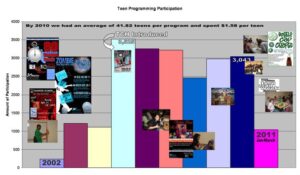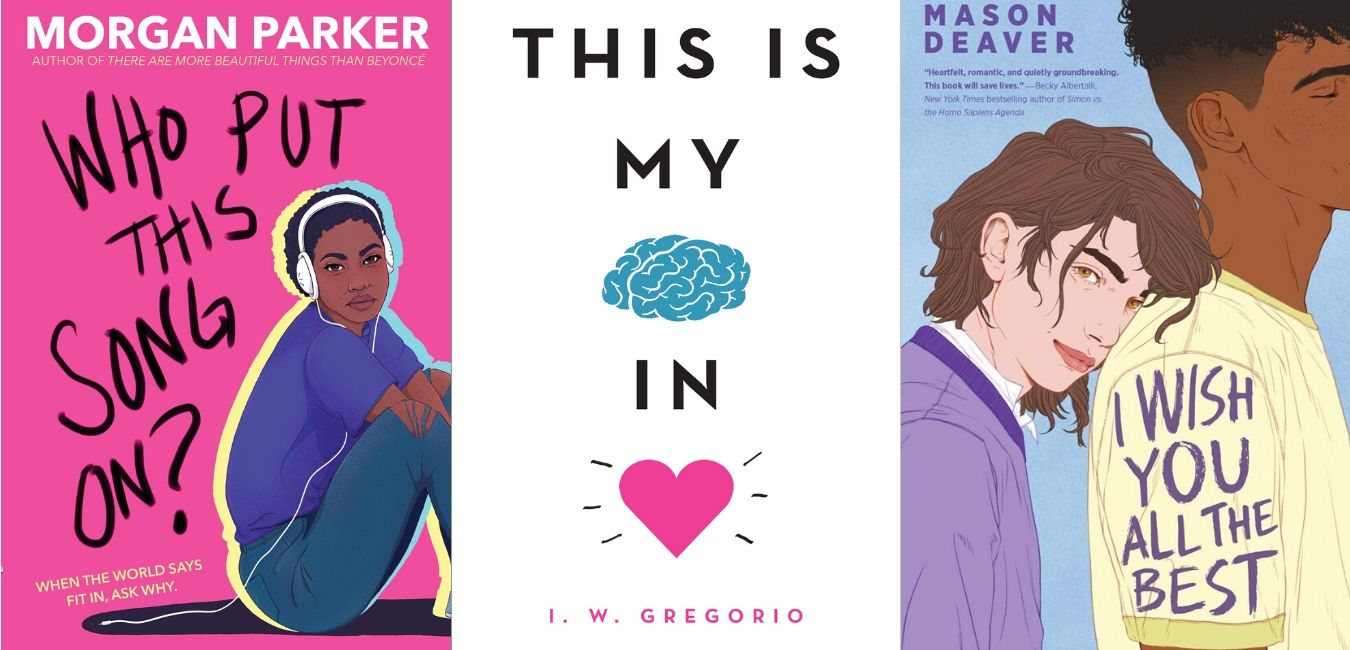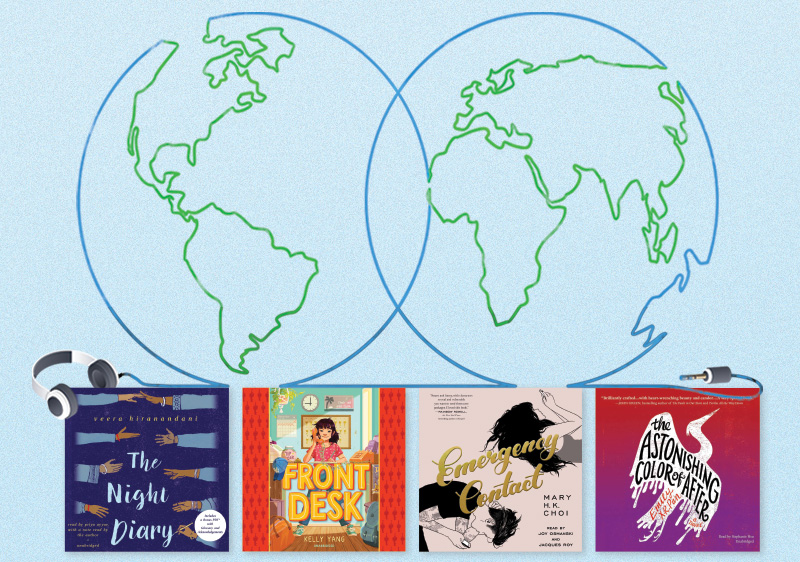Serving Full T.I.L.T. : Talking Up Teens
 For our final piece in our Serving Full T.I.L.T. (Teens in Libraries Today) series, Eden Grey is talking about advocacy. Next week we’ll here from you.
For our final piece in our Serving Full T.I.L.T. (Teens in Libraries Today) series, Eden Grey is talking about advocacy. Next week we’ll here from you.
Why is in-house advocacy important?
We all see advocacy at a national level, in social media blasts by ALA and YALSA, awareness campaigns by School Library Journal, fundraisers by the We Need Diverse Books group. What we don’t see as often are the ground-level, grassroots efforts to increase awareness about Teen Services and the needs of modern teens. Much like the Serving Full T.I.L.T. series, initiatives by a small number of librarians are just as important as national endeavors by organizations with million dollar budgets. The advocacy efforts of individuals in their own library systems and consortiums can have a very important impact on the awareness and support of Teen Services in libraries.
When should you actively be advocating?
 Seizing the opportunity whenever it arises sounds good in theory, but isn’t so good in practice. As an advocate for Teen Services, you’ve got to choose your battles wisely. Not every department meeting and program planning session is a good time to talk up your teens and your outreach stats. Instead, here are some specific opportunities for actively talking up your service to teens:
Seizing the opportunity whenever it arises sounds good in theory, but isn’t so good in practice. As an advocate for Teen Services, you’ve got to choose your battles wisely. Not every department meeting and program planning session is a good time to talk up your teens and your outreach stats. Instead, here are some specific opportunities for actively talking up your service to teens:
ADVERTISEMENT
ADVERTISEMENT
Seize (almost) every opportunity for sharing a warm and fuzzy story. Don’t do it every day, but every few days if you see an opening to share something heartwarming one of your teens said, or a nice outcome from an outreach visit, go ahead and make it into a story. These stories should be shared most often with your supervisor and other administrative officials, but can also be shared with your other co-workers. Your boss will most likely share the stories with others, even with his or her boss, and word about your teens and how you serve them will get around.
Ask to have meetings with your supervisor that are just focused on your services to teens. Make it clear that you want to talk about how you’re doing, what your numbers are like, what’s working and what’s not, etc. Show your supervisor everything you’re doing, and why it’s important. These meetings are all about you – and the focus should stay that way if you make that clear from the outset. If you have a good supervisor, he or she will understand the purpose and meaning of these meetings. If that is not the case, take the meetings to the next level – maybe meet with a department head, branch manager, or even ask to speak to your director if you are not being heard by others. These meetings should happen at least twice a year, but don’t be afraid to ask for more frequent meetings if you feel the need to.
Techniques of In-House Advocacy
Numbers
It is so important to keep track of as many numbers as possible. Number of programs, program attendance, number of students, teachers, and librarians served at outreach, circulation of the YA collection, number of teens who use the board games in your teen area, teen volunteer hours, and the list could go on.
Just recording the numbers isn’t enough. Put them in spreadsheets or tables and keep track of annual data.
Stories & Anecdotes
Heart-warming stories go a long way toward changing the perception of teens in libraries. If you have a good memory for stories and enjoy telling them in other aspects of your life, you’ll have no problem recording a bunch of anecdotes to tell your boss and coworkers. However, if you’re like me and are extremely awkward and hesitant when it comes to telling stories, here are some tips:
-
Keep it short. Stick to the point or result of the story.
-
Include names and other specific information.
-
Jot down details of the story in your program reports or where you record your attendance or other numbers.
For example, my regular group of teens has a couple of ringleaders that my coworkers are very familiar with. Nate and Maine are a little bit infamous at my library. However, when a new person shows up at programs, I can count on those boys to welcome them, show them the ropes, and introduce them to everyone. The new kid immediately feels welcome, and like part of the family. Whenever this happens I make sure to tell my boss about it – it shows just how caring, responsible, and kind my teens are. See also: Sharing Stories by Heather Booth.
Reports
If you don’t submit monthly reports to your supervisor, you should seriously consider asking them about it. While it may lead to your coworkers seriously resenting you, it will be worth it in the long run for everyone. Creating monthly reports of your programs and services shows just how much work you’re doing for Teen Services, and allows you to compare your work to previous months and years. Annual reports just aren’t enough when you’re dealing with the wide variety of tasks that Teen Services Librarians do.
Turn the numbers you record into reports. Compare numbers from previous months and years. Ask how devoting time to one aspect of your job affects the results of other aspects: Has program attendance increased since you started working there? What about since you got into those new schools or classes? Has circulation gone up or down since you implemented those new programs?
Take the answers to these questions and present them to your supervisor/s. Show them the clear-cut results of your hard work. If you submit a monthly report, include the tables of data and your conclusions. Those reports will be read by your supervisor’s boss, and most likely looked over by the library’s director as well.
Public Relations
ADVERTISEMENT
ADVERTISEMENT
Taking photos at programs and while teens are volunteering is also a great way to share a quick “anecdote,” and not only with your coworkers, but with the rest of the community as well. Recently my library’s head of PR sent out a reminder that she is always looking for stories. She keeps them in folders in her email, shares them with the library director, and uses them for community and media outreach. Sharing those stories with the media may lead to a local newspaper wanting to spotlight one of your teen programs or teen volunteers. Your library director may share stories from your outreach visits when he or she is at a committee or council meeting in the community. Having photos to go along with the stories means PR can share them on social media or the library’s website.
Advocacy Takeaways
 Maintain a balance between talking up your teens and your own work, and just working hard. Take the right opportunities to share your work, and if those opportunities don’t arise on their own, ask for meetings with your boss.
Maintain a balance between talking up your teens and your own work, and just working hard. Take the right opportunities to share your work, and if those opportunities don’t arise on their own, ask for meetings with your boss.
Don’t just record numbers every month; turn those numbers into meaningful data. Make reports tracking everything from program attendance to outreach numbers to board game and video game usage. Share those reports with your library’s administration whenever possible, and use the numbers to back up your own needs and use of time.
Always be advocating. Seize the opportunity to talk up your teens to a grumpy coworker. Share information about your teen volunteer program to an overworked teacher or school librarian. Chat up people in the community about the library and the things you do for teens. Don’t assume that people know what you do at your job – enlighten them, whether they’re the cashier at the craft store or your weekly game night friends.
For more on advocacy, check out our various posts on advocacy under Professional Development
Serving Full T.I.L.T. (Teens in Libraries Today) series:
January 14 By the Numbers, making the case for teen services using basic demographic information (Karen Jensen)
January 21 Sarcasm, Spice and Everything Awesome: The Developing Teen (Rebecca Denham)
January 28 Teen Brain Science 101 (Heather Booth)
February 4 Asset Building 101, How using the 40 Developmental Assets can help us plan and evaluate teen programming (Karen Jensen)
February 11 Diverse teens, diverse needs (Eden Grey)
February 18 Sharing stories, how knowing and sharing the stories of our teens can help make the case (Heather Booth)
February 25 Empathy, remembering what it means to be a teen and how it makes us better teen services librarians (Karen Jensen)
March 4 A Teen Services 101 Infographic (Karen Jensen)
Filed under: Advocacy, Professional Development, Serving Full TILT
About Karen Jensen, MLS
Karen Jensen has been a Teen Services Librarian for almost 30 years. She created TLT in 2011 and is the co-editor of The Whole Library Handbook: Teen Services with Heather Booth (ALA Editions, 2014).
ADVERTISEMENT
ADVERTISEMENT
SLJ Blog Network
The Ultimate Children’s Book Illustrator Gift Guide 2024
MORE 2025 ALA YMA Predictions! American Indian Youth, Asian/Pacific American Awards, and Schneider Family
Flash Gordon Adventures | This Week’s Comics
The Seven Bills That Will Safeguard the Future of School Librarianship
ADVERTISEMENT









